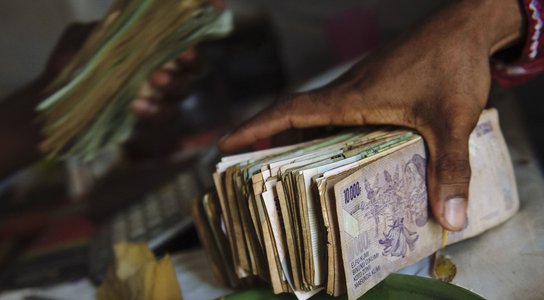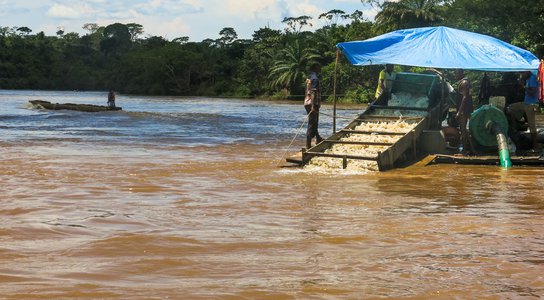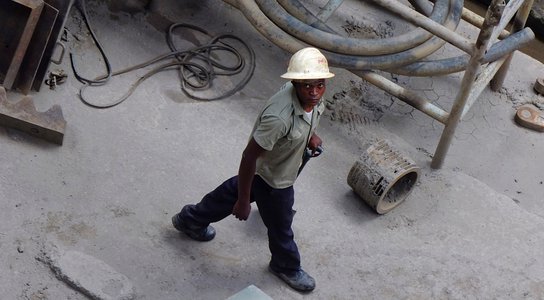A mining company in eastern Democratic Republic of Congo is ceding one third of its gold production to the son of a senior army officer, Global Witness reveals today. The case came before a local court, which apparently did nothing to prevent the arrangement, despite the fact that Congolese law bans army officers from direct involvement in the mining sector.
Brigadier-General Etienne Mbunsu Bindu appears to have used his son as a proxy (2) to evade the law against military involvement in the mining sector and secure a slice of gold production potentially worth tens of thousands of dollars per year. The court has not intervened to prevent this. Meanwhile, 77% of Congolese live on less than $1.90 per day.
The case comes as Congo’s mining law is up for review and risks being stripped of a critical provision to prevent conflicts of interest. It also follows UN allegations that Major-General Gabriel Amisi Kumba, one of the country’s most powerful figures who has been placed on sanctions lists by the European Union and United States, is profiting from the gold sector in eastern Congo.
“These revelations are set against a wider pattern of senior Congolese army officers routinely abusing their position to line their own pockets, and a pervasive climate of impunity that lets them get away with it,” commented Natasha White, Campaigner at Global Witness. “In this case, the court appears to be letting the Brigadier-General use his son as a proxy to get around Congo’s law forbidding the military from making money from mining. The mining law’s conflict of interest provision must be maintained, strengthened and fully enforced to prevent this kind of abuse happening in the future.”
Documents seen by Global Witness detail how a five-year dispute between the mining company GEMINACO and Brigadier-General Bindu’s son, Ada Shebindu, has been resolved through an out-of-court settlement. The agreement stipulates that the Bindus will drop claims against GEMINACO in exchange for the company handing over almost half of its gold production – 30% to Ada Shebindu and 10% to customary chiefs.
The dispute arose from a February 2012 agreement in which Ada Shebindu allegedly agreed to cede his gold washing site at Omate mine in Walikale, North Kivu, to GEMINACO, in exchange for a 15% cut in gold production. In January 2017, Ada Shebindu – represented by his father – took GEMINACO to court in the Goma Tribunal de Commerce for not keeping its side of the deal.
Brigadier-General Bindu has a long history of involvement in the minerals trade in Walikale and his interests at Omate date to at least 2010 when he had a similar agreement with GEMINACO, alongside Major-General Amisi.
Brigadier-General Bindu did not respond to Global Witness’ requests for comment. One GEMINACO shareholder confirmed the gold-sharing agreement, but a second shareholder based in the capital claimed the agreement was null and void, saying he had not seen the “amicable agreement” document.
Bindu and Amisi are part of a wider pattern: the illegitimate involvement of army officers of all ranks in Congo’s minerals sector has been well-documented for decades. More broadly, Congo’s senior public officials from all sides of the political divide have been accused of abusing their office for personal enrichment, often with or enabled by foreign companies and jurisdictions. Reports by the Congo Research Group and Bloomberg show how President Kabila and his family have stakes in over 80 businesses worth tens of millions of dollars. Global Witness recently revealed how $750 million paid by mining companies to Congo’s state bodies in the past few years have “disappeared,” never making it to the national treasury.
The Mining Code’s conflict of interest provision must be maintained, fully enforced and, Global Witness argues, strengthened. Brigadier-General Bindu’s involvement and interests in North Kivu’s mining sector, and GEMINACO’s operations at Omate should be further investigated and, if wrongdoing found, they should be held to account in line with Congolese law.
Amid Congo’s current crisis and at a time when political elites stand widely accused of abusing their power for personal gain, these steps are more important than ever to ensure that the population sees the benefits of the country’s rich resource wealth.
/ ENDS
Contacts
Notes to editor:
- Article 27 of Law No. 007/2002 of July 11, 2002 relating to the Mining Code of Democratic Republic of Congo forbids members of the armed forces from applying for or obtaining mining rights, artisanal miner or trader cards, and to be approved as authorized traders for mineral substances from artisanal mining. Article 20 of Loi no. 13/005 du 15 janvier 2003 portant statut du militaire des Forces Armées de la République Démocratique du Congo also forbids army officers from directly or indirectly doing business.
- Through his son, Brigadier-General Bindu is able to exert control over an interest in Congolese gold. This would be technically legal if his son were underage, but Global Witness has been informed by two sources that this is not the case. The court should have investigated the propriety of the agreement and if necessary rejected the case, but it instead appears to have ignored this crucial element.
- For more information on Global Witness’
recommendations on the proposed revisions to the Congolese mining code, please
see: https://www.globalwitness.org/documents/18091/GW_DRC_mining_code_analysis-15.10.15.pdf
You might also like
-
Briefing Omate
How a senior Congolese army officer receives a major slice of gold production from a mining company with consent of a court
-
Report River of Gold
How the state lost out in an eastern Congo gold boom, while armed groups, a foreign mining company and provincial authorities pocketed millions
-
Report Regime Cash Machine
How the Democratic Republic of Congo’s booming mining exports are failing to benefit its people